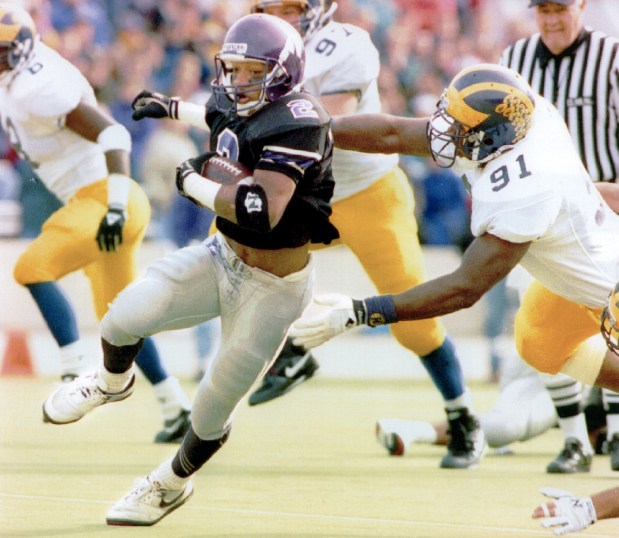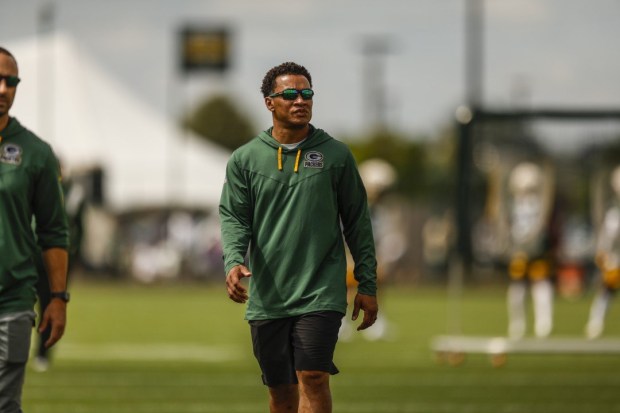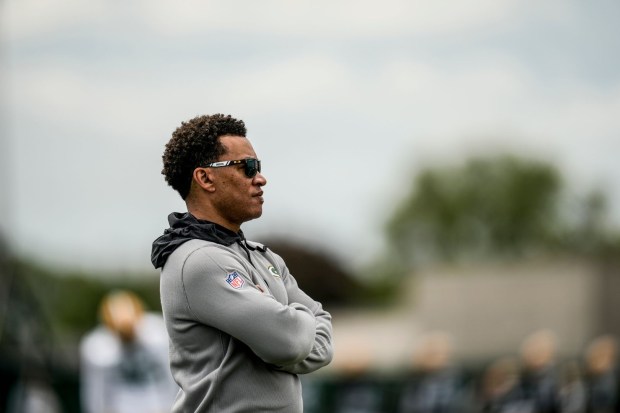Lee Gissendaner never really considered a career in scouting during his playing days at Northwestern.
But scouting, he said, found him.
The former Wildcats wide receiver and returner, who won the 1992 Chicago Tribune Silver Football as the Big Ten’s best player, had a brief pro career in the NFL, Canadian Football League and World League of American Football in Europe.
When injuries mounted and he didn’t find the on-field success he hoped for, he asked himself: “Do I want to keep banging my head against the wall or do I want to find another way to be successful?”
Gissendaner returned to his home state of Ohio to pursue a master’s in sports administration at Kent State. Maybe he could coach or become a small-school athletic director, he thought.
“It was definitely a hard decision because you spend your whole life playing the game you love, and you feel like as long as you work hard, things are going to work out,” Gissendaner said. “Well, it doesn’t always work out like that. There are plenty of guys who put it on the line on the field, giving everything they have, and even that’s still not enough.
“Being so many years in scouting, I can see both sides of it now. … It’s part of life, and it’s basically how you adjust and keep moving forward.”
In 1998, Gissendaner had an encounter that changed the course of his life.
John Dorsey, then the director of college scouting for the Green Bay Packers, was evaluating a Kent State player and spoke with Gissendaner about NFL internships. Gissendaner told Dorsey he wanted to continue with his studies. A few months later, Dorsey called again about a full-time job and said the Packers would help him finish his degree.
It felt like it was meant to be.
Gissendaner, now a senior personnel executive for the Packers, began a scouting and personnel career that has spanned 26 years, including 23 in Green Bay. He has tried to channel the same work ethic and passion he had on the field at Northwestern into his work building football teams.
Returns on investment
Gissendaner remembers the stir Northwestern football coach Gary Barnett caused when he was introduced at a January 1992 basketball game and declared he was going to “take the purple to Pasadena.”
Northwestern hadn’t won more than four games since 1971 and hadn’t been to the Rose Bowl since 1949.
“That was something that we had never heard before around Northwestern,” Gissendaner said. “But for him to come in with a goal like that, it kind of opened our eyes to what was possible if you put the work in. And from then on, his message was all about being positive and visualizing what you wanted for your future and what you wanted the program to look like, and we kind of embraced it.”
Gissendaner credits that work for his breakout season as a junior in 1992, when he led the nation with 21.8 yards per punt return — still a Northwestern record — and was tops in the Big Ten with 1,564 all-purpose yards. That included 68 catches for 846 yards playing with quarterback Len Williams.
Gissendaner is one of five Northwestern players to win the Silver Football — and the last Wildcat to win it. Running back Mike Adamle (1970), fullback Art Murakowski (1948), quarterback Otto Graham (1943) and center Tim Lowry (1925) were the other winners.
Barnett told the Tribune that Gissendaner was the “perfect player” in the way he worked and was dedicated to his teammates.
“I was determined not to take any plays off,” Gissendaner said. “Even back then, I kind of realized you can’t play this game forever and you’ve got to make the most of every opportunity you have. And I was willing to do whatever it took to help my team be successful.”
Barnett and defensive coordinator Ron Vanderlinden declared before the 1992 season they wanted to be in the top 10 in the nation in punt returning. Gissendaner said the Wildcats players looked around thinking, “How does he think that’s going to happen here?”
“And lo and behold, we put the work in on special teams and it was a group effort and obviously we ended up leading the nation that year,” he said.

Gissendaner, who was a star wide receiver and pole vaulter at Stow-Munroe Falls High School in Ohio, made it happen.
He made waves early that season with a 72-yard punt return for a touchdown and a 53-yard punt return in Week 3 against Stanford, then had a 72-yard punt return the following week against Purdue. The Stanford game remains one of his favorite memories because his uncle had traveled to California to surprise him in the stands that day.
“He has courage, great vision,” Barnett told the Tribune of Gissendaner’s return game in 1992. “He catches it well. He’s smooth.”
The Purdue game, in which Gissendaner also had touchdown catches of 70 and 21 yards, was one of three wins for the Wildcats that season. That included a comeback from a 20-point, third-quarter deficit to beat Illinois 27-26. Gissendaner stretched out to catch the winning 4-yard touchdown pass from Williams.
Gissendaner and Williams returned to Northwestern in 1993, and Gissendaner totaled 58 catches for 669 yards and 1,261 all-purpose yards. But despite an early one-point upset of No. 22 Boston College on a Williams-to-Gissendaner touchdown connection followed by a two-point conversion, the Wildcats won just two games that season.
Gissendaner said it was satisfying to see the Wildcats complete the program turnaround a couple of years later. He and his father traveled to watch Northwestern’s appearance in the 1996 Rose Bowl.
“We were sitting up in the stands and I’m looking at all this purple around the stadium in Pasadena, and I’m like, he really did bring the purple to Pasadena,” Gissendaner said. “To go back there and see what that success early on has brought to the program and the campus — and quite frankly notoriety around the country — it’s comforting.”
Still competitive
Gissendaner still has the report he wrote in his first year scouting for the Packers.
He was tasked with covering the Big Ten, and that included a Michigan quarterback named Tom Brady.
Gissendaner didn’t predict Brady would become a seven-time Super Bowl champion and three-time league MVP. But he did give the 2000 sixth-round draft pick a glowing report, citing his unique talent and potential as an NFL quarterback.
Gissendaner looks back on that report to remind himself of the eye for talent he had even at a young age.
“Along my personal journey, there are things that help remind you of your true values and the reasons certain things happen,” Gissendaner wrote in a follow-up email. “This ‘Tom Brady scouting report’ sort of gave me internal validation and has always motivated me to continue to pursue excellence, in both my personal and professional life.”
After pivoting from his three-year pro playing career, which included stops with the Houston Oilers and Minnesota Vikings, Gissendaner started his scouting career with the Packers.
He found that he liked the independence and ability to be his own boss on the road. He loved being around the game, knowing he was helping to build a team. And he didn’t mind the travel, even though it wasn’t always easy.
“It’s not always glamorous, that’s for sure,” Gissendaner said. “There are a lot of long drives and short nights getting from one school to the next. You put your head down and you’re grinding through reports. You’re trying to stay up on your work. There’s a lot of traffic, a lot of travel and it’s exhausting.

“But you know what the end result is, and you’re trying to do everything you can to help build a team and find the right talent.”
Gissendaner has been with the Packers his entire front-office career except for three seasons, when he joined a revamped New York Jets regime to become a national scout in 2015. He wanted to broaden his exposure and experience with different schools and areas of the country and felt it was the right move to further his career.
When the opportunity to return to the Packers on the pro scouting side arose in 2018, he took the chance to work with people he grew up with in the business, knowing it also would mean less travel at a time when his two children were busy with activities.
Since rejoining the Packers, Gissendaner has represented the organization at the Stanford-NFL League of Leaders executive education program and the NFL’s front-office accelerator program, meant to help executives prepare for potential general manager interviews and enhance their leadership skills.
“It’s another way to keep working at your craft, not be complacent, still try to develop as a person and as an executive,” Gissendaner said. “You’re never satisfied with where you are. You’re still competitive in trying to develop yourself, and it’s a great opportunity to network and learn new things about the business and about your craft.”
Gissendaner’s favorite moment during his scouting and personnel career is easy to guess: when the Packers won the Super Bowl in the 2010 season. Being on top of the NFL world, knowing he helped build a team that put it all together, produced an almost kidlike excitement.
One of his favorite players he helped bring to the Packers was running back James Starks, a 2010 sixth-round pick who had sat out his senior season at Buffalo with a shoulder injury. Gissendaner saw rare physical tools and strong character, and he took a leap of faith in advocating for him. Starks made an impact as a role player for the 2010 Super Bowl team and played in 76 games over seven seasons in Green Bay.
But when Gissendaner considered what he is most proud of during his career, he landed on his consistency.
In the last 26 years, the Packers have made the playoffs 18 times, won 12 division titles and won the Super Bowl. As he helped build those teams, Gissendaner believes he maintained the same level of dedication throughout.
“I feel like I’m the same person I was when I got into this business,” he said. “I have the same passion to win, the same competitive drive, and it doesn’t stop. … I’m content but still never satisfied, still chasing championships.”
Northwestern Silver Football winners
- 1925: Tim Lowry, C
- 1943: Otto Graham, QB
- 1948: Art Murakowski, FB
- 1970: Mike Adamle, RB
- 1992: Lee Gissendaner, WR




